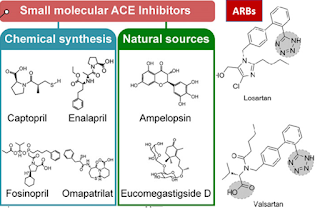ACEI or ARB?

Lowering high blood pressure is associated with significant reduction in all major cardiovascular events, all-cause mortality, stroke, coronary events, and heart failure. Since medicine is still not personalized neither particularly precise, guidelines for choosing the right drug keep evolving. For adults with hypertension requiring pharmacological treatment, the following three classes of pharmacological antihypertensive medications are used as an initial treatment: diuretics , ACE inhibitors or ARBs , and calcium channel blockers. ACE inhibitors (ACEIs) reduce the activity of the angiotensin-converting enzyme (ACE) which is responsible for hormones that help control blood pressure. Synthetic ACE inhibitors, such as captopril, enalapril, lisinopril, and temocapril, are in clinical use for the treatment of hypertension. Lisinopril is found to have significant negative effect on perceptual motor skills, thus other ACE inhibitors such as Benazepril, Fosinopril,...